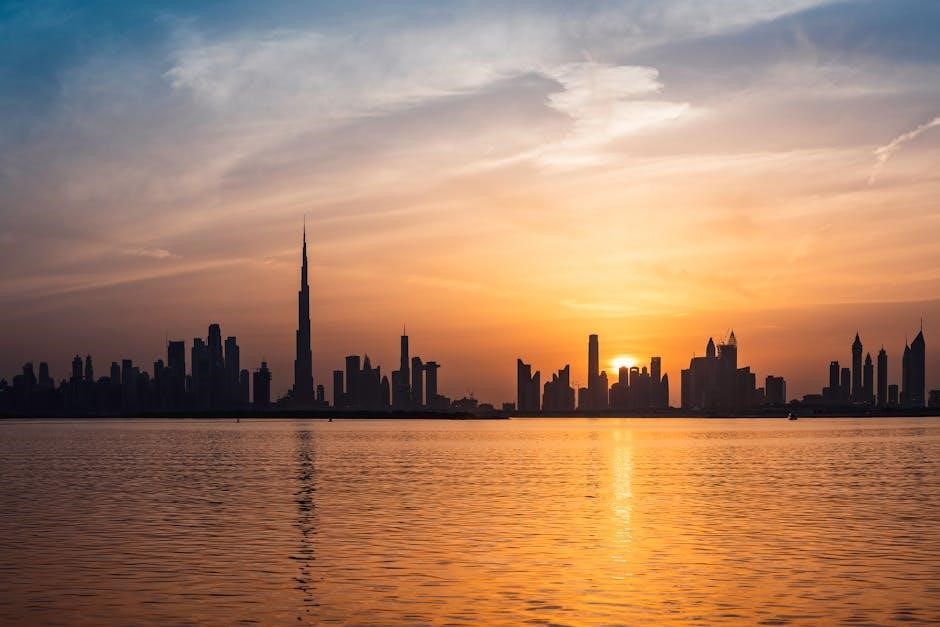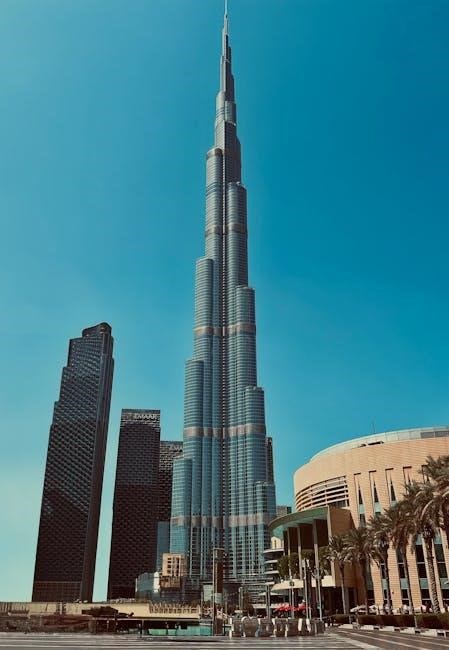Dubai Leaks, a collaborative investigative project, has exposed widespread foreign ownership of properties in Dubai, revealing ties to global elites, politicians, and criminals. The data spans 2020-2022, uncovering illicit activities and raising concerns about money laundering in the emirate’s real estate market.

Background
Dubai Leaks, part of the “Dubai Unlocked” project, analyzed property records from 2020 to 2022, exposing the emirate’s role in global wealth flows. The investigation revealed how Dubai’s real estate market attracts foreign investors, raising questions about transparency and regulatory oversight in the region.
2.1 Dubai’s Real Estate Market
Dubai’s real estate market has long been a magnet for global investors, offering a unique blend of luxury, tax-free incentives, and strategic location. The emirate’s property sector has grown exponentially, attracting billions of dollars in foreign investment. According to the Dubai Leaks, foreign ownership in Dubai’s housing market reached an estimated $160 billion in 2022, with properties owned by individuals from over 100 countries. The market’s appeal lies in its high returns, world-class infrastructure, and relatively lenient regulatory environment. However, this growth has also raised concerns about transparency and the potential for illicit activities. The “Dubai Unlocked” investigation revealed that the emirate’s real estate sector has become a hotspot for wealthy elites, politicians, and even individuals linked to criminal activities. The leaked data, spanning from 2020 to 2022, provides unprecedented insight into how Dubai’s property market operates and who benefits from it. This has sparked debates about the need for stronger regulations to curb money laundering and ensure accountability in the sector.
2.2 Previous Leaks and Controversies
Dubai has faced several high-profile leaks and controversies in recent years, shedding light on its real estate market’s opaque dealings. The “Dubai Leaks” are part of a larger pattern of revelations that have exposed the emirate’s role in global financial activities. Previous leaks, such as those linked to the Panama Papers, revealed connections between Dubai’s property market and individuals tied to corruption and illicit wealth. For instance, Pakistani politicians like Pervez Musharraf and Asif Ali Zardari were linked to Dubai properties, raising questions about the sources of their funds. Similarly, Russian oligarchs, following the invasion of Ukraine in 2022, were found to have moved assets, including luxury properties in Dubai, to avoid sanctions. These controversies have repeatedly highlighted Dubai’s reputation as a haven for wealth seeking anonymity. The emirate’s real estate sector has long been criticized for its lack of transparency, enabling individuals to purchase properties through shell companies and other secretive arrangements. These practices have drawn international scrutiny, with many calling for stricter regulations to combat money laundering and financial misconduct.

Key Findings
The investigation revealed extensive foreign property ownership in Dubai, totaling $160 billion in 2022. High-profile individuals, including Pakistani politicians and Russian oligarchs, were exposed. Additionally, criminals like Ruja Ignatova and sanctioned Hezbollah financiers were linked to Dubai properties.
3.1 Extent of Foreign Ownership
The Dubai Leaks reveal that foreign ownership in Dubai’s real estate market reached an estimated $160 billion in 2022. Indians topped the list, owning 35,000 properties, followed by Pakistanis and Russians. The data also exposed properties linked to sanctioned individuals and criminals, highlighting Dubai’s appeal as a global real estate hub.
3.2 Notable Individuals Exposed
The Dubai Leaks uncovered a list of high-profile individuals, including former Pakistani President Asif Ali Zardari and ex-dictator Pervez Musharraf. Additionally, the “Cryptoqueen” Ruja Ignatova and her associates were found to own properties in Dubai. The leaks also revealed Russian oligarchs linked to sanctioned entities, further highlighting the emirate’s role in harboring controversial figures.

Implications
The Dubai Leaks have significant implications for the real estate market, potentially destabilizing property values and investor confidence. Politically, the exposure of high-profile individuals could lead to diplomatic fallout and increased regulatory scrutiny, challenging Dubai’s reputation as a financial hub.
4.1 Impact on Real Estate Market
The Dubai Leaks have cast a shadow over the emirate’s real estate market, potentially affecting property values and investor confidence. The revelation that foreign ownership reached an estimated $160 billion in 2022, with properties linked to global elites, politicians, and criminals, raises concerns about market transparency. This could deter future investments, especially if buyers and investors perceive Dubai’s market as a haven for illicit activities. Additionally, the exposure of high-profile individuals, including sanctioned politicians and criminals, may lead to increased regulatory scrutiny and potential sanctions, further destabilizing the market. The leaks also highlight the role of Dubai as a refuge for individuals seeking to hide assets, which could tarnish its reputation as a secure and legitimate financial hub. As a result, the real estate sector may face significant challenges in maintaining its attractiveness to international investors, potentially leading to a slowdown in transactions and developments.
4.2 Political and Economic Fallout
The Dubai Leaks have sparked significant political and economic repercussions, challenging the emirate’s reputation as a global financial hub. The revelation of Russian oligarchs moving assets to Dubai following the invasion of Ukraine has drawn international scrutiny, potentially straining diplomatic relations. Additionally, the exposure of high-profile individuals, such as Pakistani politicians and sanctioned Hezbollah financiers, has raised questions about Dubai’s role in harboring illicit wealth, putting pressure on local authorities to address these issues. Economically, the leaks could deter foreign investment, as investors may view Dubai’s real estate market as a high-risk sector due to its association with criminal activity and money laundering. The estimated $160 billion in foreign property ownership, much of which is now under suspicion, underscores the potential economic fallout. Furthermore, the involvement of global elites and criminals in Dubai’s property market has prompted calls for stricter regulations and greater transparency, which could reshape the emirate’s economic landscape. These developments threaten to undermine Dubai’s efforts to position itself as a clean and stable financial center, potentially leading to long-term economic and political consequences.

Global Elite and Criminals
Dubai Leaks revealed properties owned by global elites and criminals, including Cryptoqueen Ruja Ignatova, Pakistani politicians, and Russian oligarchs. The data exposed how Dubai’s luxury real estate market became a haven for sanctioned individuals and those linked to illicit activities worldwide.
5.1 Politicians and Business Leaders
The Dubai Leaks have exposed a significant number of high-profile politicians and business leaders with ties to luxury properties in Dubai. Notable figures include former Pakistani President Asif Ali Zardari and ex-dictator Pervez Musharraf, whose ownership of prime real estate has raised questions about the sources of their wealth. Additionally, Indian nationals top the list of foreign property owners, with over 35,000 properties linked to 29,700 individuals, sparking debates about offshore wealth and tax implications. The leaks also revealed Russian oligarchs moving assets to Dubai following international sanctions post-Ukraine invasion, highlighting the emirate’s role as a refuge for sanctioned individuals. Furthermore, the Cryptoqueen Ruja Ignatova and her associates were found to own properties in Dubai, despite being wanted for crypto fraud. These revelations underscore how Dubai’s real estate market has become a magnet for politically exposed persons and business elites seeking to obscure their financial dealings.
5.2 Criminal Connections

The Dubai Leaks have uncovered alarming ties between Dubai’s real estate market and individuals linked to criminal activities. Australian cocaine traffickers, relatives of West African dictators, and sanctioned Hezbollah financiers have all been identified as property owners in Dubai. Ruja Ignatova, known as the “Cryptoqueen,” and nearly a dozen of her associates were found to own properties in the emirate, despite being wanted for cryptocurrency fraud. Additionally, the leaks revealed that Russian oligarchs and Belarusian illicit actors have purchased properties in Dubai, possibly to evade international sanctions. These findings suggest that Dubai has become a haven for criminals seeking to launder money or hide assets. The presence of such individuals raises serious questions about the emirate’s regulatory framework and its ability to combat financial crimes. The revelations have also highlighted how Dubai’s luxury real estate market has inadvertently facilitated the movement of illicit funds globally, further tarnishing its reputation as a clean financial hub.
Money Laundering and Regulation
Dubai’s real estate sector has been linked to significant money laundering activities, with foreign nationals exploiting loopholes in regulations to conceal illicit funds. The leaks highlight systemic failures in oversight, enabling criminals and sanctioned individuals to invest undetected in luxury properties.
6.1 Cases and Examples
The Dubai Leaks have uncovered numerous instances of money laundering through real estate transactions, involving high-profile individuals and criminal networks. One notable case involves Ruja Ignatova, known as the “Cryptoqueen,” who allegedly used Dubai properties to hide assets linked to a cryptocurrency scam. Similarly, Russian oligarchs tied to the Kremlin have been identified as owners of luxury properties in Dubai, with some acquiring these assets after facing international sanctions following Russia’s invasion of Ukraine.
Additionally, the leaks revealed that relatives of West African dictators and sanctioned Hezbollah financiers have invested heavily in Dubai’s real estate. For instance, Pakistani political figures, including former President Asif Ali Zardari, have been linked to properties purchased with questionable funds. These cases highlight how Dubai’s real estate market has been exploited to launder illicit wealth, often with minimal oversight from authorities.
Such examples underscore the systemic vulnerabilities in Dubai’s regulatory framework, which has allowed criminals and sanctioned individuals to operate with relative impunity. These revelations have raised serious concerns about the emirate’s commitment to combating financial crimes and its alignment with global anti-money laundering standards.
6.2 Regulatory Failures
The Dubai Leaks have exposed significant gaps in the emirate’s regulatory framework, enabling the use of its real estate market for illicit financial activities. Despite efforts to improve transparency, authorities have failed to implement robust anti-money laundering measures, allowing criminals and politically exposed persons to operate with impunity. The lack of due diligence in property transactions has been particularly problematic, with many deals involving shell companies or nominees to obscure ownership.
One major failure is the absence of effective oversight in tracking the sources of funds used in property purchases. This has enabled individuals like Ruja Ignatova and Russian oligarchs to launder millions of dollars through Dubai’s real estate. Additionally, the emirate’s “buyer beware” approach, which prioritizes transaction speed over scrutiny, has further facilitated these activities. The leaks highlight how Dubai’s regulatory shortcomings have made it a hub for dirty money.
These revelations have raised questions about the UAE’s commitment to combating financial crimes. While authorities have acknowledged the need for stronger regulations, the lack of tangible reforms suggests systemic challenges remain. The ongoing exploitation of Dubai’s real estate market underscores the urgent need for stricter enforcement and greater transparency to address these failures.
Media and Public Reaction
The Dubai Leaks have sparked widespread media coverage, with global outlets collaborating to expose the extent of illicit activities. Public reaction has ranged from outrage to calls for greater transparency, highlighting concerns about financial corruption and governance in Dubai’s real estate sector.

7.1 Media Coverage
The Dubai Leaks have garnered significant attention from international media, with over 70 outlets collaborating to expose the details. Major publications have highlighted how Dubai’s real estate market has become a haven for illicit funds, involving global elites and criminals.
7.2 Public Response
The Dubai Leaks have sparked widespread public reaction, ranging from shock to outrage. Many citizens and experts have raised concerns about the transparency of Dubai’s real estate market and its vulnerability to illicit activities. The revelation of high-profile individuals and criminals owning properties has led to calls for greater accountability and regulatory reforms. Social media platforms have been flooded with discussions, with many questioning how such large-scale financial operations went unnoticed for so long. Activists and policymakers are demanding stricter anti-money laundering measures to prevent the misuse of Dubai’s real estate sector. Meanwhile, the general public has expressed growing mistrust in the system, highlighting the need for enhanced oversight to ensure fair and legal transactions. The leaks have also reignited debates about economic inequality and the role of global elites in exploiting financial havens like Dubai. This public outcry underscores the urgent need for systemic changes to restore trust and integrity in the emirate’s financial systems.